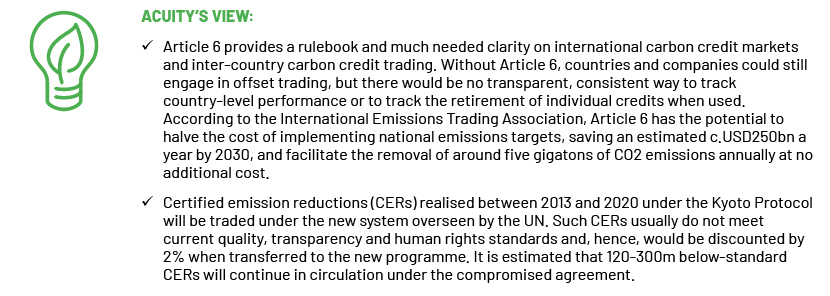Published on December 23, 2021 by Keshav Ahuja
One of the most awaited climate change summits in recent times – the 2021 United Nations Climate Change Conference (or COP26) – began on 31 October in Glasgow and ended on 12 November. The event witnessed leaders across the world discuss and pledge initiatives in all areas of climate change and sustainability: renewable power, coal phase-out, climate action financing and carbon markets, to name a few.
In this blog, we look at the key highlights of COP26, categorised into three initiatives – emission reduction, climate financing and carbon offsetting – and discuss our views on what these initiatives mean for the world.
Emission reduction initiatives:
-
-
Global Methane Pledge: About 105 countries pledged under the Global Methane Pledge to pare methane emissions by at least 30% by 203011 from 2020 levels. The pledge covers countries accounting for approximately half of global methane emissions and 70% of global GDP. The initiative emphasises methane leakage from oil and gas wells, fossil fuel infrastructure, pipelines, livestock farms and landfill sites.
-

-
-
Coal phase-out commitments: More than 40 countries committed to move away from coal at the COP265. In addition, 28 new members joined the Powering Past Coal Alliance (PPCA) to phase out coal, joining 160 countries, sub-nationals and businesses already part of the alliance. 20 new country members, including Vietnam, Morocco and Poland, have committed to ending new coal plant projects. Major international banks, such as HSBC, Fidelity International and Ethos, have also agreed to end international public funding of fresh unabated coal power projects by end-2021.
-

-
-
Agreement to curb public financing of fossil fuel projects: Around 20 countries, including Italy, Canada, the US and Denmark, signed a UK-led agreement to end public backing for unabated fossil fuel energy projects by end-20226. The countries instead aim to prioritise clean-energy projects.
-

-
India announces net-zero emissions deadline of 2070: India – the world’s third-largest CO2 emitter – announced 2070 to be its net-zero emissions target3. It also committed to a five-point climate action plan, which includes several 2030 targets, such as increasing non-fossil-fuel energy capacity to 500GW, meeting 50% energy needs using renewable energy, reducing projected greenhouse gas emissions by one billion tons and curbing carbon intensity to below 45% from the 2005 level
-

Climate financing initiatives:
-
-
Investments to reduce South Africa’s coal dependence: South Africa, the twelfth-largest CO2 emitter, is set to receive c.USD8.5bn from the US, the UK, France, Germany and the EU to reduce its coal reliance4. Currently, 80% of South Africa’s power is generated from coal; the country aims to shrink the share to 60% by 2030, when wind and solar power are expected to contribute 25% to its power generation.
-

-
-
Climate finance pledges to aid the transition of developing and underdeveloped countries: In 2009, developed nations had agreed to assist developing and underdeveloped countries by providing c.USD100bn annually until 2020 to aid in transitioning to clean energies and reducing their reliance on fossil fuels7. This target has not been fully met. At COP26, several developed countries agreed to increase climate finance pledges, including the US, the UK, Canada, Japan, Norway, Australia and Spain.
-

Carbon offset initiatives:
-
-
Carbon markets push through Article 6: The rules for Article 6 were finalised six years after the Paris Climate Agreement8. Article 6 boosts carbon markets and sets regulations for international carbon trading, linking multiple trading schemes and mechanisms and promoting increased accounting and transparency. It includes a market-based process to enable countries to leverage international carbon offsets to achieve the nationally determined contribution (NDC) goals set under the 2015 Paris Agreement and provide clear accounting guidance on carbon credit trade between countries and on current credit mechanisms. It also puts in place a mechanism to eliminate double counting of carbon credits by both the buying and selling countries – the seller country will add the sold units to its NDCs while the buyer country will deduct an equal number of units, maintaining the accounting balance.
-

-
-
More than 100 countries vow to stop deforestation by 2030: Above 100 countries, which are
-

home to c.85% of the world’s forests, pledged to end deforestation by 20302. These countries include Brazil, China, Colombia, Congo, Indonesia, Russia and the US, all boasting massive forest cover. 28 countries also pledged to end deforestation caused by the trade of agricultural products such as palm oil, soya and cocoa. The pledge includes c.USD19bn in public and private funds, which will likely be used to restore damaged forest cover, prevent wildfires and support indigenous communities. Around 30 financial companies, including Aviva, Schroders and Axa, have pledged to end deforestation-linked investments. In addition, a c.USD1.2bn fund will be established to protect the Congo Basin – the second-largest tropical rainforest in the world.
How Acuity Knowledge Partners is helping businesses with climate change and energy transition
The accelerating pace towards carbon neutrality puts several businesses at risk but also presents ample opportunities to lucratively transition to a low-carbon business model. Acuity Knowledge Partners supports in developing pathways towards carbon neutrality and helps identify potential opportunities in carbon and clean-energy markets through our strategic support and advisory services. We offer our expertise in carbon trading mechanisms and clean-energy markets, along with in-depth market research capabilities across the energy value chain, helping some of the biggest companies in the world transition towards sustainability and carbon neutral operations.
Sources:
2COP26: World leaders promise to end deforestation by 2030 - BBC News
3India Commits to Net-Zero Emissions by 2070 – The Diplomat
4COP26: South Africa hails deal to end reliance on coal - BBC News
56COP26: More than 40 countries pledge to quit coal - BBC News
7COP 26: How much are poor countries getting to fight climate change? - BBC News
8What the passage of Article 6 means for carbon markets | Greenbiz
Tags:
What's your view?
About the Author
Keshav Ahuja is part of the Private Equity and Consulting team at Acuity Knowledge Partners, Gurgaon. He has over 8 years of experience working across the energy sectors in multiple business intelligence, corporate strategy and consulting roles. He is currently supporting clients in formulating decarbonization strategies to enable businesses to transition towards sustainability and carbon neutrality. Prior to joining Acuity Knowledge Partners, Keshav has worked with an Oil and Gas Supermajor and a clean-tech venture capital firm.
Like the way we think?
Next time we post something new, we'll send it to your inbox







